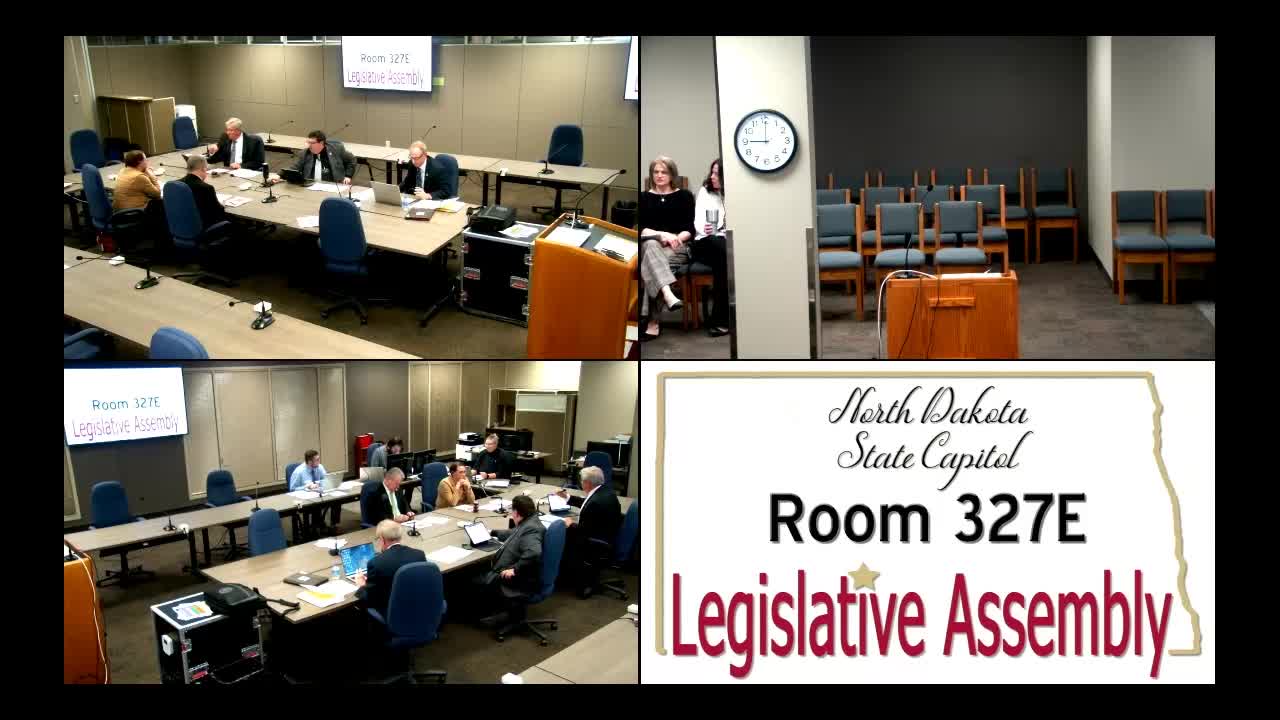Conference committee reviews Senate changes to House Bill 1377 on campaign finance reform
Get AI-powered insights, summaries, and transcripts
Subscribe
Summary
At a conference committee meeting on House Bill 1377, legislators reviewed Senate amendments that would remake North Dakota's campaign finance reporting system to a continuous, checkbook-style online filing platform and adjust several reporting thresholds and rules.
At a conference committee meeting on House Bill 1377, legislators reviewed Senate amendments that would remake North Dakota's campaign finance reporting system to a continuous, checkbook-style online filing platform and adjust several reporting thresholds and rules.
The measures matter because they change how contributions and expenditures are reported, who must itemize donations, how the state treats funds maintained by out-of-state political committees, and which state-owned properties are off-limits for political activity. Committee members agreed to reconvene with the Secretary of State's office to clarify implementation and software readiness before moving the bill to each chamber's floor.
Senator Rohrs, who presented the Senate's changes, said the bill's primary goal is transparency. "Transparency is the number 1 goal," he said, and described a system that would allow "more logical kind of checkbook style viewing" so reporters and residents can track beginning and ending balances over time.
Under the Senate amendments described to the committee, the state's new filing system (funded in the prior legislative session) would open January 1 for continuous entry, calculate running balances automatically, aggregate small transactions while protecting individual entries below itemization thresholds from open-records disclosure, and allow flexible expenditure categories in the software rather than fixed categories in statute. The amendments would also change language from "received" to "deposited" when reporting the date of a contribution.
The committee heard several numeric changes. The candidate contribution itemization threshold would rise from $200 to $250 (the transcript describes an increase to "the $2.50," which committee members clarified as $250); ballot measures and petition activity would keep a $100 itemization threshold. Pre-election supplemental deadlines would be fixed to April 30 and September 30 regardless of election dates, and the bill sets an effective date of January 1, 2026, with transitional language for prior-calendar-year reporting. The bill would increase civil fines for late or amended filings in stepped amounts (approximately $100, then $250, then $500 as delays continue), and the system would allow filers to save drafts that remain private until the filer hits "submit."
Senator Rohrs told the committee the new software will automate aggregation (for example, recognizing multiple small donations from the same person) and propagate amendments forward so filers would not need to correct multiple past filings manually. He said the software also would allow free-text memo entries and a drop-down for common categories so the system can roll up expenditures for reporting.
The committee discussed a recent Attorney General opinion and how it affects reporting by federal PACs that contribute to nonfederal candidates in North Dakota; Rohrs said the amendments clarify that committees only must report to North Dakota while they are "playing in our game," and are not expected to report indefinitely once they cease activity in the state. The bill would add an open-records exemption protecting individual entries below the applicable itemization threshold while still showing aggregate totals publicly.
The members debated whether the Senate's rewrite had gone too far from the House committee's work. Representative Schauer summarized the House GBA subcommittee's six-week effort and said, "It's a fragile coalition that we have in GVA," noting the House had formed a subcommittee that met nine times with the Secretary of State's office and legislative counsel. Schauer said late, large changes from the Senate made reconciliation difficult and suggested the conference committee take the Senate bill as presented and continue negotiations on the floor if necessary.
Representative Doctor questioned the increase in the itemization threshold and pressed for the rationale behind the change from $200 to $250. Senator Rohrs responded that the $200 figure predated 2002 and that indexing for inflation had been contemplated in the past; he said the change was not a matter of strong personal preference but rather a policy choice the committee could accept or modify.
Senator Barto asked whether the exemption of the governor's residence from the definition of "state-owned property" would open the door to hosting political events at that property; Rohrs said events could still be hosted but would have to be rented at market rate, implying the exemption was narrow and intended to let a governor perform political functions consistent with party leadership without running afoul of the property-use ban.
No formal motions or votes were taken. The committee concluded by agreeing to reconvene with the Secretary of State for a demonstration and implementation discussion before proceeding. Chairman Porter adjourned the meeting and said the committee would be rescheduled to hear from the Secretary of State.
Votes at a glance: none (no motions or final actions were recorded).
